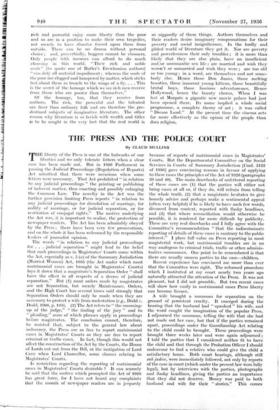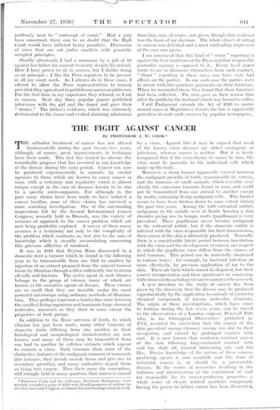THE PRESS AND THE POLICE COURT
By CLAUD MULLINS
THE liberty of the Press is one of the bulwarks of our liberties and we only tolerate fetters when a clear ease has been made out. But in 1926 Parliament in passing the Judicial Proceedings (Regulation of Reports) Act admitted that there were occasions when some fetters were necessary. That Act prohibited " in relation to any judicial proceedings " the printing or publishing of indecent matter, thus enacting and possibly enlarging the Common Law. The novelty in the Act was the further provision limiting Press reports " in relation to any judicial proceedings for dissolution of marriage, for nullity of marriage, or for judicial separation, or for restitution of conjugal rights." The motive underlying the Act was, it is important to realise, the protection of newspaper readers. The Act has been admirably obeyed by the Press ; there have been very few prosecutions, and on the whole it has been welcomed by the responsible leaders of journalist opinion.
The words " in relation to any judicial proceedings for . . . judicial separation " might lead to the belief that such proceedings in Magistrates' Courts come within the Act, especially as s. 5 (a) of the Summary Jurisdiction (Married Women) Act, 1895 (the Act under which most matrimonial cases arc brought in Magistrates' Courts) lays it down that a magistrate's Separation Order " shall have the effect in all respects of a decree of judicial separation." But (1) most orders made by magistrates arc not Separation, but merely Maintenance, Orders, and the High Court has several times said strongly that Separation Orders should only be made when they are necessary to protect a wife from molestation (e.g., Dodd v. Dodd, 1906, p. 189). (2) The Act refers to " the summing- up of the judge," " the finding of the jury " and to " pleading," none of which phrases apply in proceedings before magistrates. The conclusion cannot, therefore, be resisted that, subject to the general law about indecency, the Press are as free to report matrimonial cases in Magistrates' Courts as they arc free to report criminal or traffic cases. In fact, though this would not affect the construction of the Act by the Courts, the House of Lords cut out from the Bill, at the instigation of Lord Cave when Lord Chancellor, some clauses relating to Magistrates' Courts.
Is restriction regarding the reporting of matrimonial cases in Magistrates' Courts desirable ? It can scarcely be said that the motive which prompted the Act of 1926- has great force, for I have not heard any complaints that the morals of newspaper readers are in jeopardy because of reports of matrimonial cases in Magistrates' Courts. But the Departmental Committee on the Social Services in Courts of Summary Jurisdiction [Cmd. 5122 of 1936] gave convincing reasons in favour of applying to these eases the principles of the Act of 1926 (paragraphs 39 and 40). The main drawbacks of unfettered reporting of these cases are (1) that the parties will either not bring cases at all or, if they do, will refrain from telling the whole truth, (2) that a magistrate hesitates to give homely advice and perhaps make a sentimental appeal (often very helpful) if he is likely to have such few words, divorced from context, reported with flashy headlines, and (3) that where reconciliation would otherwise be possible, it is rendered far more difficult by publicity. These are very real drawbacks and I fully agree with the Committee's recommendation " that the indiscriminate reporting of details of these cases is contrary to the public interest." I place full .value on Press reporting in most magisterial work, but matrimonial troubles are in no way analogous to criminal trials, traffic or othea adminis- trative summonses. One point to be remembered is that there are usually unseen parties to the case--children.
Recent experience has convinced me more than ever that the Committee were right. The reformed procedure which I instituted at my court nearly two years ago naturally attracted the attention of the Press. It was not pleasant, but I did not grumble. But two recent cases will show how easily in matrimonial cases Press liberty can become licence.
A wife brought a summons for separation on the ground of persistent cruelty. It emerged during the hearing that the husband had " spanked " his wife, and the word caught the imagination of the popular Press. I adjourned the summons, telling the wife that she had not made out her ease, but that if the parties remained apart, proceedings under the Guardianship Act relating to the child could be brought. These proceedings were brought three weeks later and were again adjourned ; I told the parties that I considered neither fit to have the child and that through the Probation Officer I should endeavour to find a relative who could give the child a satisfactory home. Both court hearings, although still sub judice, were immediately followed, not only by reports of the case in court (which under the present law were fully legal), but by interviews with the parties, photographs and flashy headlines, giving the parties an importance that they did not deserve. Money was paid to both husband and wife for their " stories." This comes perilously near to " contempt of court." Had a jury been concerned, there can be no doubt that the High Court would have inflicted heavy penalties. Discussion of cases that are sub judice conflicts with generally accepted principles.
Shortly afterwards I had a summons by a girl of 19 against her father for consent to marry despite his refusal. Here I have power to sit in camera, but I dislike doing so on principle ; I like the Press reporters to be present in all my court work. As I always do in these cases, I offered to allow the Press representatives to remain provided they agreed not to publish any names or addresses. For the first time in my experience they refused, so I sat in camera. Next day three popular papers published interviews with the girl and the fiance and gave their " stories." The father's evidence, which was extremely detrimental to the fiance and evoked damning admissions from him, was, of course, not given, though that evidence was the basis of my decision. The whole object of sitting in camera was defeated and a most misleading impression of the case was given.
I am convinced that this kind of " stunt " reporting is against the best traditions of the Press and that responsible journalist opinion is opposed to it. Every local paper wrote to me to dissociate themselves from such conduct. " Stunt " reporting in these eases can have very bad effects on the parties. In one such case the parties were in arrear with hire-purchase payments on their furniture. When we reconciled them, they found that their furniture had been collected. The firm gave as their reason that after the publicity the husband's trade was bound to suffer.
Until Parliament extends the Act of 1926 to matri- monial cases in Magistrates' Courts the law is apparently powerless to curb such excesses by popular newspapers.















































 Previous page
Previous page